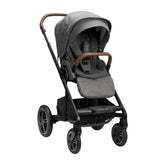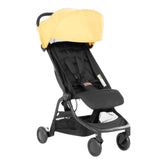5 Common Signs of Labor: How to Tell If Baby Is Almost Here

Updated 29 Dec 2024
So, you're pregnant and naturally curious about what labor will be like, how long it will go on, and how to distinguish between the real deal and a false alarm, right? Here's the thing: every birth is a unique experience, making it difficult to give precise answers to all those burning questions. The good news, though, is that there’s something you can do about it. Familiarizing yourself with those telltale signs of labor can give you some hints that your baby's long-awaited arrival is just around the corner. Here are five of the most common signs of labor approaching.
Signs Your Body Is Getting Ready for Labor
1. Nesting
Picture this: you wake up one morning, and suddenly you're hit with a burst of energy like never before. All you can think about is stocking up your freezer with yummy meals, getting that crib perfectly set up, and organizing your baby's wardrobe by color. It's like an uncontrollable urge to create the perfect space for your little one! This phenomenon is commonly known as the nesting instinct, and it can strike at any point during pregnancy. But here's an interesting twist – for some women, it's actually a sign that labor might be on the horizon. So go ahead and embrace your nesting instincts, but remember to pace yourself. Save some of that newfound energy for the incredible journey of labor that lies ahead.

2. Increase in Vaginal Discharge
Let's talk about something that might catch you by surprise during pregnancy – an increase in vaginal discharge. As your body prepares for labor, a mucus plug forms to protect your uterus from any unwanted visitors. But as you enter the late third trimester, that plug can start making its way out and you might notice some changes down there. You may see an uptick in vaginal discharge that's clear, pink, or even slightly bloody. Don't worry – this doesn't necessarily mean labor is knocking at your door just yet, but it could be a sign that it's on its way in the next few days. If you notice vaginal bleeding that's as heavy as your usual period, it's time to reach out to your healthcare provider ASAP. Heavy bleeding isn't something to brush off, as it could signal a potential problem that needs immediate attention.
3. Lightening
As your due date approaches, your baby's head descends or “drops” lower into your pelvis, creating a bit of extra space up top. Doctors refer to this as lightening. It's like a little rearrangement happening inside as your baby cleverly maneuvers into position, aiming to have their head down low for a smooth exit. If you're a first-time mom, you can expect this to happen around two to four weeks before labor kicks in, but every pregnancy is unique, so the timing may vary. For moms who have been through labor before, the lightening process doesn't usually occur until you're actually in labor. So don't be surprised if you suddenly feel a bit lighter or notice your baby bump looking a tad different. It's all part of the exciting journey towards meeting your little one. Just remember, your body is doing its thing to prepare for labor, and lightening is just one of the many signs that the big day is drawing near.
4. Water Breaks
The amniotic sac, filled with fluid, provides protection for your baby in the uterus. But as labor approaches, the membranes will rupture, resulting in your water breaking. Television and movies often exaggerate the timing and circumstances of this event. (For example, it's unlikely that you'll suddenly experience it in the middle of a crowded restaurant during dinner.) For most women, the reality is that the membranes rupture and amniotic fluid leaks only after other signs of labor have already appeared. And don't expect a dramatic gush of water either. For many people, it's more like a gentle trickle. If you're unsure whether the fluid is amniotic fluid, urine, or something else, it's best to consult your healthcare provider or go to your delivery facility. They will evaluate you and your baby to determine the next steps.
Once your amniotic sac is no longer intact, the timing becomes important. The longer it takes for labor to begin after your water breaks, the higher the risk of infection for you and your baby. In such cases, your healthcare provider might decide to stimulate uterine contractions through labor induction in order to prevent any complications.
5. Contractions
As labor approaches, you'll start to experience contractions. This can feel different for every woman. Some describe them as pounding, tightening, stabbing, or similar to menstrual cramps. These contractions will become stronger and more frequent as you get closer to giving birth.
While contractions can be one of the signs of early labor, it’s important to note that not all contractions mean you're in active labor. Towards the end of pregnancy, especially during the third trimester, you might experience what's called Braxton-Hicks contractions, also known as "false labor." These contractions are irregular and typically occur sporadically. They also tend to be gentler compared to the real deal, and they don't follow a regular pattern. So, if you're feeling mild contractions that aren’t happening at consistent intervals, chances are it's just those "practice" contractions. When you start noticing contractions happening less than ten minutes apart, that's when you should pay closer attention. This frequent pattern is often a clear sign that true labor has begun, and it's time to get ready to meet your little one!

When to Call the Doctor
Don't worry if you're still unsure about when to announce, "It's time!" Your doctor or midwife will be there to guide you through it all and help you recognize the important signs. If you're nearing your due date and think you might be going into labor, your healthcare provider has probably already given you instructions on what to do. For example, they might have told you to contact them when you're experiencing contractions that are about five minutes apart for at least an hour. Keep in mind that labor contractions won't always have the exact same spacing, but if they're becoming more consistent, stronger, and lasting longer (typically around 30 to 70 seconds each), it's a good idea to contact your doctor. They can explain what might be happening and ask you to come in if there's any uncertainty. Don't feel embarrassed about calling outside of office hours either. Your practitioner understands that this is part of their job, and they're there to support you. Remember, always contact your doctor or midwife if:
- You notice any bleeding or bright red discharge (not brown or pinkish).
- Your water breaks, especially if the fluid appears green or brown. This could be a sign of meconium, which is your baby's first stool, and it's important to address any potential risks.
- You experience blurred or double vision, a severe headache, or sudden swelling. These symptoms could indicate preeclampsia, a condition related to high blood pressure during pregnancy that requires medical attention.
Around 90 percent of pregnancies last until about week 37. This is considered full-term. However, if you're experiencing labor symptoms before reaching your 37th week, you could be showing signs of preterm labor. In such cases, it's important to contact your healthcare provider for guidance and support.
Disclaimer: The information on our site is NOT medical advice for any specific person or condition. It is only meant as general information. Please contact your health provider if you have any medical questions or concerns about your child or yourself.









